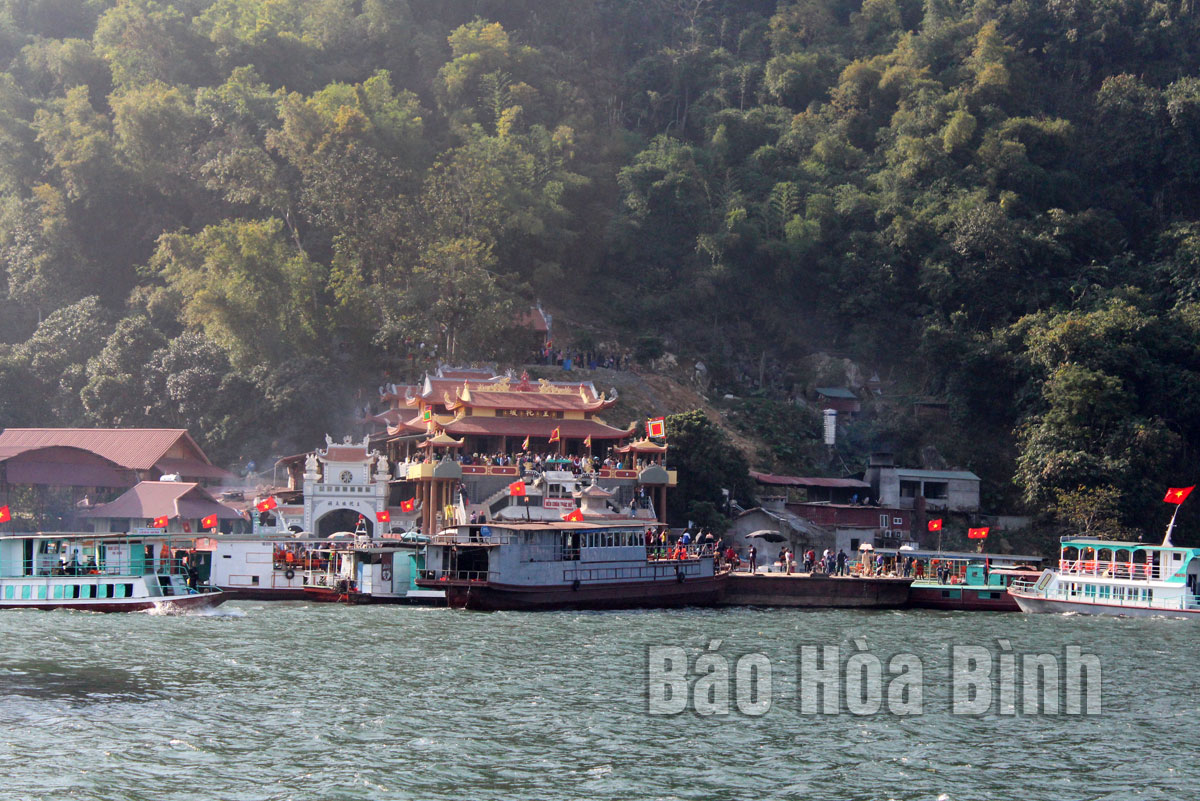
(HBO) - Da Bac district has majestic natural landscapes and is home to five ethnic groups namely Muong, Tay, Dao, Kinh and Thai. Each group has its own unique cultural identities that have created peaceful and beautiful villages which are favourable for developing community-based cultural tourism.
Thac Bo Temple, a famous spiritual tourist destination,
attracts tens of thousands of tourists every year.
The district is home to Pu Canh Nature Reserve with the highest peak of Hoa
Binh (1,373 m), along with many beautiful mountains, caves and waterfalls,
creating charming landscapes such as Lo Lan Cave, Ke Stream and Hien Luong Bay
in Hien Luong commune.
There are three national historical sites in the locality, along with Thac Bo
temple which has been recognised as a provincial cultural and historical relic.
Over the past years, the district has developed four community-based tourism
sites in Hien Luong and Tien Phong communes because these places still preserve
unique cultural identities in terms of customs, housing architecture, costumes,
cuisine, folk songs and dances, traditional musical instruments and festivals.
With a unique way of doing tourism, for a long time, Cao Son commune’s Sung
hamlet, where more than 70 households of Dao Tien ethnic group reside, is a
favourite destination of foreign tourists. Visitors are attracted by the beauty
of Bieu mountain, Sung cave, and hundreds of years old Shan Tuyet tea hill.
It can be said that with the advantage of beautiful natural landscapes, cool
climate, unique cultural identities and cuisine, Da Bac has a lot of potential
to develop high-quality tourism, attracting domestic and international
tourists.
To fully exploit this potential, the district’s Party Committee and People's
Committee have issued many important documents, including Resolution No. 09-NQ/HU,
dated February 6, 2015 on the tourism development of Da Bac district for the
2015-2020 period with orientations to 2030 and a tourism development project to
2020 with a vision to 2030.
The local administration has set the goal of mobilising investment
resources to develop tourism in a synchronous, professional and modern manner,
contributing to economic restructuring, creating more jobs, improving people's
living standards, promoting cultural values as well as protecting the
environment.
The district has implemented many solutions for tourism development,
prioritising capital for key tourism projects and infrastructure systems. It
has also encouraged and created favourable conditions for investors, solving
difficulties for businesses, especially related to site clearance and project
appraisal.
The promotion of tourism has been enhanced to ensure its efficiency. Attention
has been paid to improving the quality of tourism products, raising people’s
awareness of environmental protection as well as preservation of cultural
values with tourism development./.
Located just a 20-minute drive from Hoa Binh City, Ora Hill Farmstay & Glamping Hoa Binh is a captivating new destination nestled in Mo hamlet, Bình Thanh commune, Cao Phong district. Combining farming with leisure, this tranquil retreat is perfect for those seeking balance, joy, and an immersive experience in the expansive beauty of nature.
Muong Bi - Tan Lac is renowned as one of the four famous Muong regions in Hoa Binh province. Blessed by nature with a favourable climate and stunning landscapes, Tan Lac holds great advantages for tourism development. The local tourism industry has made remarkable strides in recent times thanks to the attention and support from the local authorities and sectors.
With its strategic location, well-developed transport network, and diverse soil and climatic conditions, Hoa Binh is emerging as a must-visit destination in Vietnam's northwestern tourism corridor. The province boasts numerous attractions, including the Kim Boi hot springs (Kim Boi district), the Dau Rong cave complex (Cao Phong), the Mai Chau valley (Mai Chau), and the iconic Hoa Binh hydropower plant.
The northern mountainous province of Hoa Binh has been listed among the 71 most beautiful places to visit worldwide by the prestigious US travel magazine Condé Nast Traveller.
Hoa Binh province’s rich natural and cultural resources position it as a prime location for developing community-based tourism (CBT). In recent years, support from central and provincial policies, as well as assistance from non-governmental organisations, have encouraged local ethnic minority and mountainous communities to actively engage in the sector.



